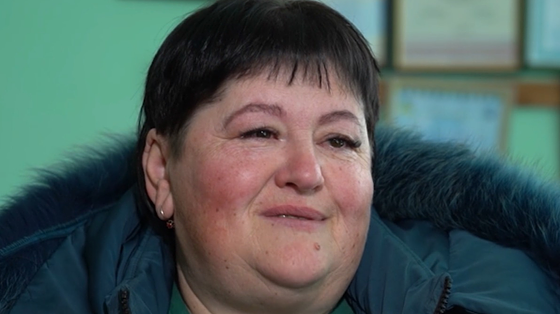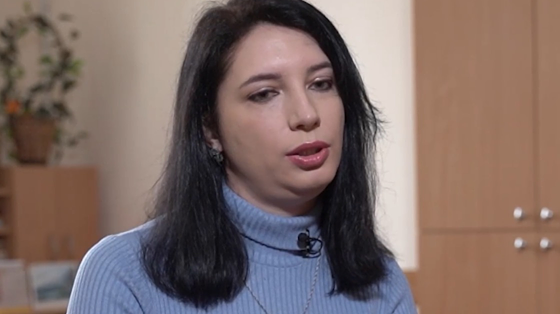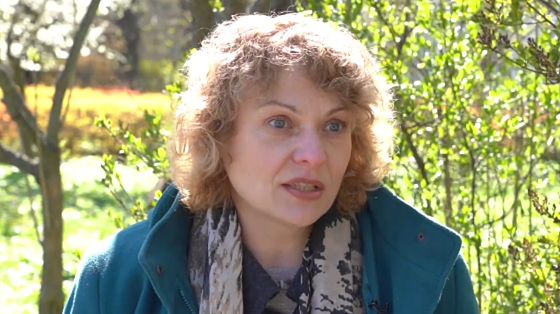“For me, the war means...”
First of all, it is a source of great grief and sorrow.
When did the war in Donbass begin for you?
This was definitely 2014, when those mass rallies were first organized by armed people who tore down Ukrainian flags from administrative buildings, from the police stations. That was when I realized the armed conflict was inevitable, there would be more to this.
Did you happen to see military actions with your own eyes?
Luckily, when those events started to happen, there were no armed hostilities yet. I did not see any actual hostilities.
What did you talk about with your family and neighbours during active hostilities?
During armed hostilities, my relatives were in the town, and I was abroad, I was working in another area. I talked to them, trying to understand what was going on. I did everything I could to prevent them from taking actions that would harm them, to keep them safe.
What do you remember the most from the experience you went through during the war?
I have realized that people are capable of uniting at the grass-roots level. That’s bad they get united only by something negative. If we could learn to unite by something positive, those things that are going on now wouldn’t have happened. People would have been more conscientious and responsible, not just for things in their personal lives, but for everything taking place beyond their flats.
We tend to erase unpleasant events from our memory. What event from the beginning of the armed conflict in Donbass would you like to forget about (or cannot forget)?
In fact, this is a bad property of our memory to keep only good things.
I wish we could remember everything to learn these lessons and stay away from falling into the same trap all over again. That’s the reason why I wouldn’t like to forget any of these events, so that they could be a good base to rely on in social action projects and to help us avoid backsliding into our past mistakes.
Have you moved because of the war? Where to? How exactly did your move take place?
Yes, I have moved away. At the time, I had a contract for a job abroad. That’s why I didn’t catch much of the occupation, I had to work until my contract expired. I saw the occupation when it only started and came back after it was over. My relatives and friends stayed here, though. I lived in Donetsk for a long time, but unfortunately, I couldn’t go to the occupied city any more. At the beginning of the occupation, I knew that the city would be blocked and there would be no way to get out of it anymore, so I had to leave. I came back Druzhkivka then, though I could have stayed in Donetsk.
What changes has the war brought into your life?
I have quit my regular work and started dealing with social action projects. After the occupation, a window of opportunity opened, and I saw that here, in Druzhkivka, I could use my experience working with people in other fields. You know, Druzhkivka is my home town, it’s close to my heart in every possible way.
How has the war influenced your everyday life?
After the occupation, I walked around the town and kept looking back to check if there was anyone threatening me because of my pro-Ukrainian views, because I believed that Ukraine should be whole and indivisible.
And as soon as I stopped watching my back in the town’s streets, someone put a note in my office saying that they remembered about me. After that, I started to look around again. Our memory does wipe away some moments of our life. So past events have somehow influenced me anyway.
What do you dream of?
I want to go to the Ukrainian Crimea. I lived and even worked in Yalta for a while. So, I would like to go back there and enjoy the sub-tropical climate in Ukrainian Yalta.
What is your idea of happiness?
This is a complicated philosophical question. Happiness is when you have a desire and an opportunity for self-fulfilment, and this has some kind of positive effect for you and your family.
What has become the most valuable and important in recent years?
Understanding that I am not the only warrior in the field. That I am not some kind of d’Artagnan thinking he’s the only awesome guy in town. I see a large number of people who want to make a change in our country, in our region. There are more good people out there, it’s just bad people are better organised. This means, good people need to learn how to properly team up.
Have you changed your attitude to life because of the war?
I thought about it at odd times.
I don’t know if I may call myself a fatalist or if I have grown to be more of a fatalist than I used to be. The thing is that I’ve come to understand that if you don’t do something now, tomorrow may be too late.
I’ve started focusing more on objective circumstances rather than only on subjective ones. One day, you might not have enough time, when something bad starts.
If you could go back to 2014, with all this knowledge about your life changes caused by the war, what would you do differently?
Think I would start working on social action projects sooner. I would do it to help people stand up united by the understanding how we can make changes at the local level, what tools there are for this purpose, how we can have our say in local and municipal issues.
Just because you do not take an interest in politics doesn’t mean politics won’t take an interest in you. This means, in that game, you’ll rather be a passive object than an actor. People must have clear ideas about the government, municipal authorities, state mechanisms and institutions, and ways to have as much impact on their lives as they have in their own homes.
Within their own homes, people have all the impact, yet they lack time, will, or understanding everywhere beyond those walls. You have to work hard to have these things.
What did you learn while overcoming all those difficulties you told us about?
I learned to never give up, even if things don’t work out well. There have been some things I had to learn by doing. If something doesn’t work out, you have to try again, experiment, keep on going anyway. You have just to keep putting one foot in front of the other.







.png)



